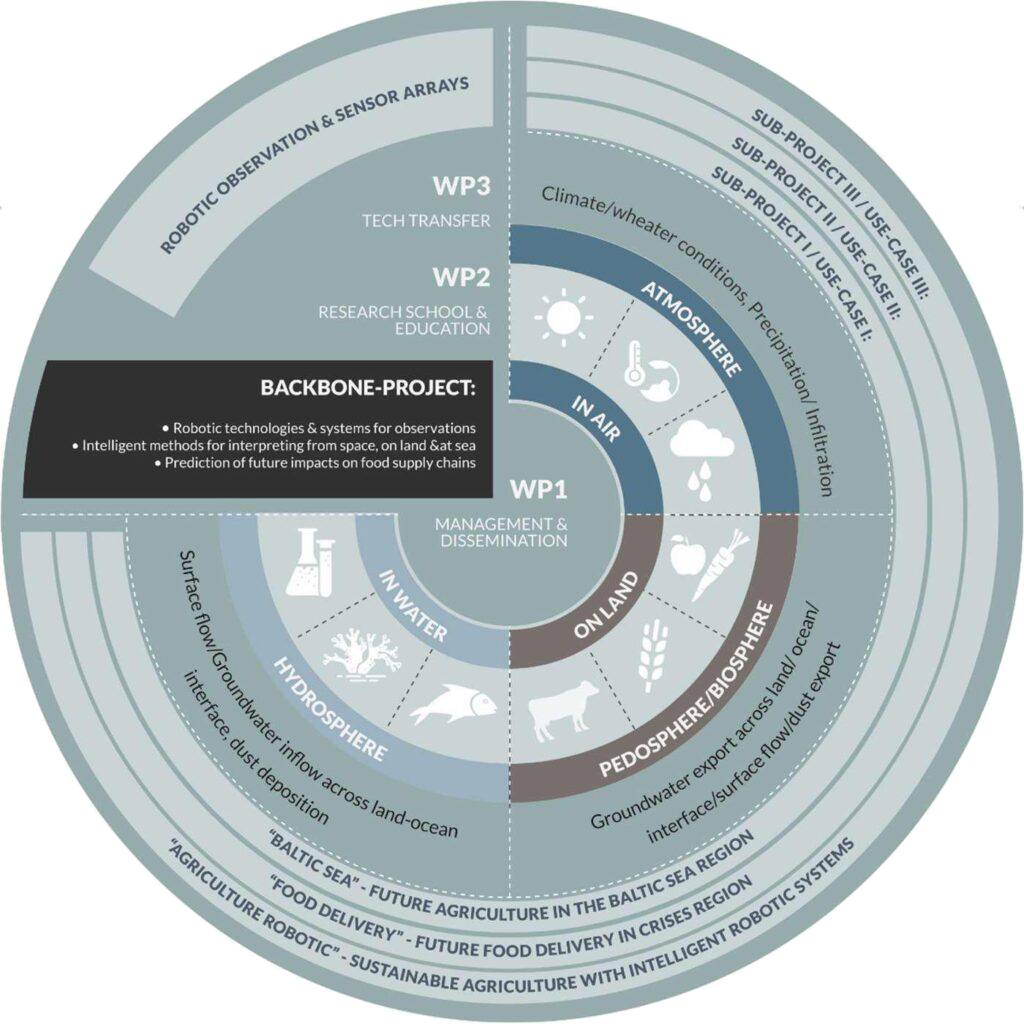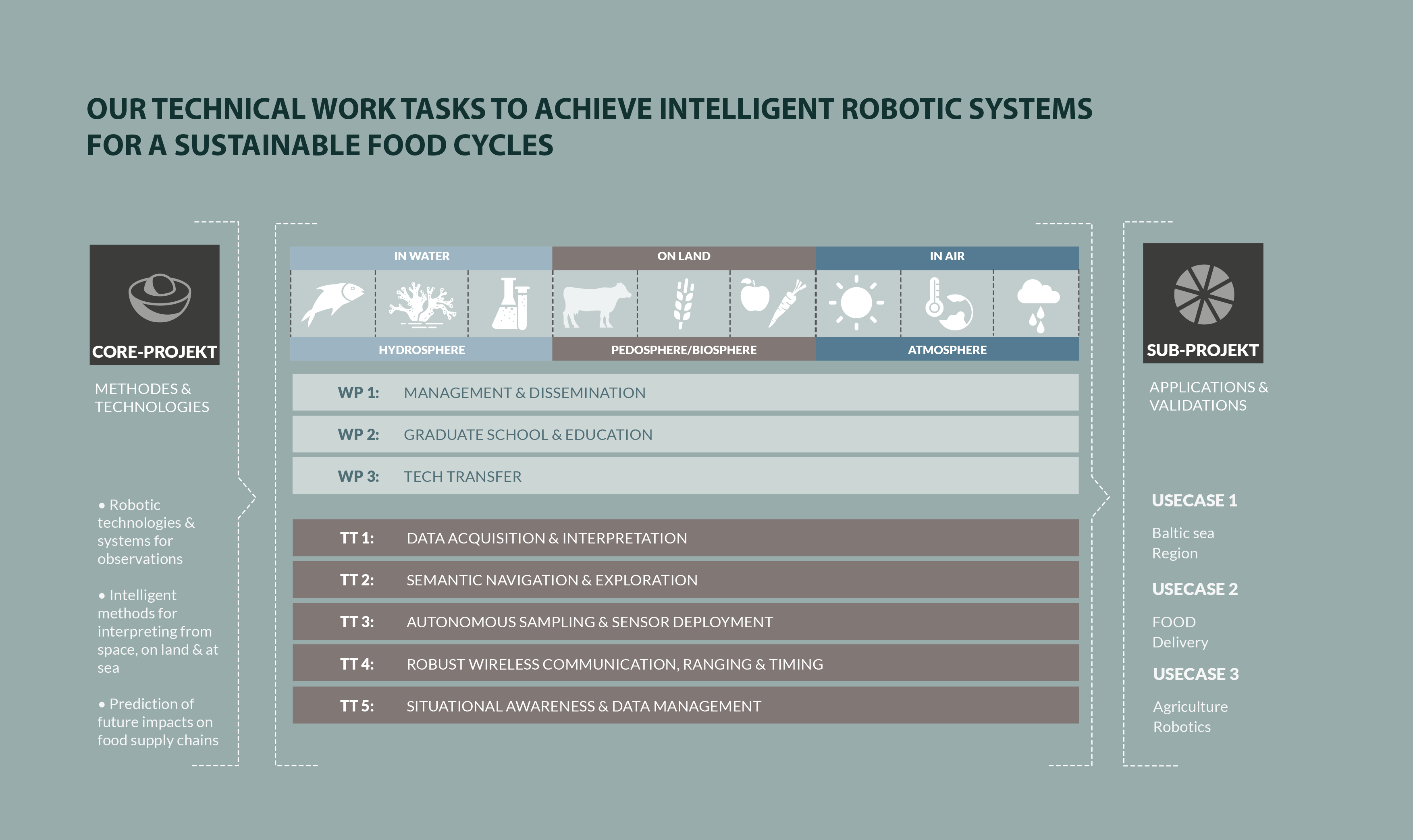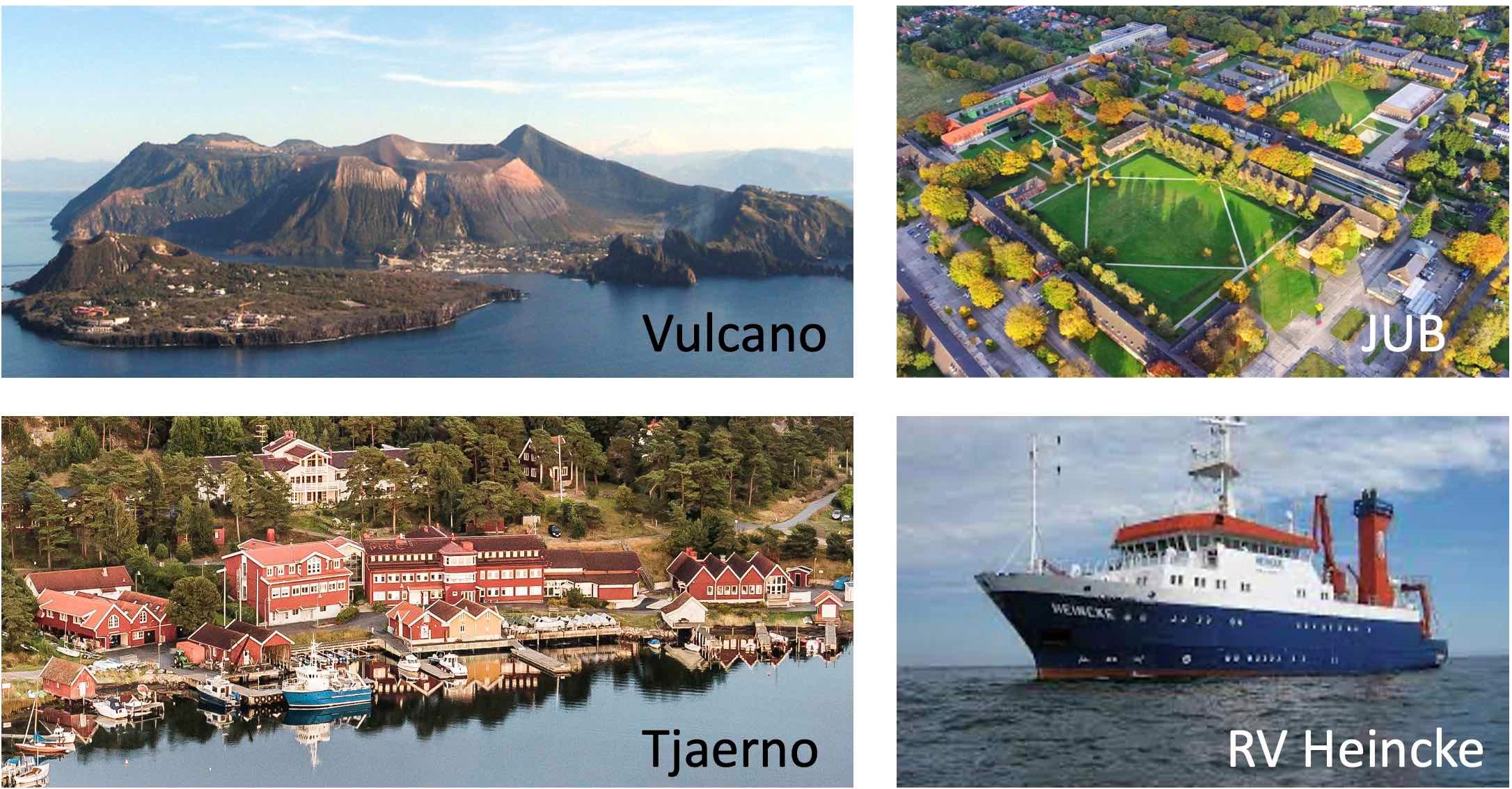The iFOODis project aims at setting up a robotic monitoring network that includes environmental measurements in the atmosphere, on land as well as adjacent waterbodies. In each of these compartments environmentally and agriculturally relevant parameters will be measured using specific sensor systems. By combining locally acting robotic networks on land and the coast with remote sensing (space and airborne), weather data, as well as databases that already exists with local/regional authorities and NGOs, the envisaged intelligent observation system will allow the holistic real-time monitoring and prediction of the environmental status (ecosystem health) along the atmosphere-land-sea transition. Among the benefits of such a large and heterogeneous network of agents, is the possibility of performing distributed measurements across a large variety of metric scales. A networked team of robots allows measuring local properties of the soil, such as compaction, erosion as well as concentration of nutrients, and carbon, which are indicators of quality and fertility. On a larger scale, satellite observations, that monitor the exploitation and change of the land, will provide information in form of spatial and temporal measurements.
The project partners will jointly develop and deploy robotic and sensing technologies. The partners will further jointly develop technologies and software allowing for a timely and swift exchange, synoptic fusion, visualization and interpretation of the recorded data. Appropriate technologies will represent a major topic in the research school hosted at the MUDS. Specific topics in robotics, data- and agricultural/environmental science will be addressed in this Research School, which is envisaged to be held in close cooperation with HIDA and MARDATA.
Backbone Project with overarching WPs and Technical and Methodical developments
for one main and two transfer use cases:

The project, is coordinated by DLR and involves partners from the Helmholtz Centres AWI, diverse DLR working groups and GEOMAR. It additionally will involve the DLR German Earth Observation Center / German Remote Sensing Data Center. By this it combine expertise in terrestrial and marine robotics including earth observation and marine environmental sciences. With respect to the envisaged case study in the model-region Schlei (Schleswig-Holstein) we collaborate with the Landes- amt für Landwirtschaft, Umwelt und Ländliche Räume (LLUR) Schleswig Holstein, Flintbek and the Ministerium für Energiewende, Landwirtschaft, Umwelt, Natur und Digitalisierung.
As a core project iFOODis aims to attract further complementing projects, like the sub projects or the future satellite projects that address specific challenges, such as the measurements of plant health, flexibility of robots, specific issues of pest control or monitoring biodiversity on land and in aquatic environments. These complementing projects shall not only focus on robotics and data science but will be open for agricultural and environmental topics. By these means we hope to bring in expertise from various disciplines to fully address the described challenge.

WP – 1: Management & Dissemination
Partner: DLR-RM, AWI, GEOMAR
WP Leader: Armin Wedler
WP – 2: Research School & Education
Partner: CUB, HMGU, AWI, DLR, GEOMAR
WP Leader: Vikram Unnithan
WP – 3: Tech Transfer
Partner: AWI, DLR, GEOMAR
WP Leader: Frank Wenzhöfer
TT – 1 : Data Acquisition & Interpretation
Partner: GEOMAR, AWI, DLR-RM, DLR-DFD, DLR-OS, DLR-SR
WP Leader: Sascha Flögel
TT – 2: Semantic Navigation & Exploration
Partner: DLR-RM, AWI, GEOMAR, DLR-KN
WP Leader: Martin Schuster
TT – 3: Autonomous Sampling & Sensor Deployment
Partner: DLR-RM, AWI, GEOMAR
WP Leader: Peter Lehner
TT – 4: Robust Wireless Communication, Ranging & Timing
Partner: DLR-KN, DLR-RM, AWI, GEOMAR
WP Leader: Siwei Zhang
TT – 5: Situational Awareness & Data Management
Partner: DLR-DFD, AWI, GEOMAR, DLR-RM, DLR-KN, DLR-SR
WP Leader: Konstanze Lechner
Regarding the approach of networking, advising and the aim of high technology transfer ambitions, the project establishes a “working group accompanying the project” which will be flexibly handled and build up during the project runtime. Thees end users and stakeholders can be divided in two groups:
Research School “iFOODis-edu” will be established
Affiliated with the already existing operating graduate school from MUDS and the already established summer school concept from CUB

In total, the Research School will consist of 6 PhD students, which are affiliated with the participating institutions DLR, GEOMAR, AWI, and CUB, while being likly enrolled into the PhD program of one of the Munich-based universities TUM or LMU.
Furthermore, in addition to the curriculum already offered by MUDS, there will be workshops and summer schools organized by CUB, where the lecturers of these will be PIs from the partners of iFOODis, as described next.
The training workshops will focus on providing a solid theoretical background to topics such as earth observation, remote sensing, climate change, oceanography, robotics and data management – all of which are vital for future agriculture, food production, and food security. These workshops will com-plement existing courses and lectures offered within the MUDS graduate school. In terms of plan-ning, it is envisaged that the workshops will be held as short, intensive, one or two week-long blocks in January, while the Summer Schools will take place during the months of June for a period of two weeks. The workshop will also help to prepare the participants for the Summer Schools.
A typical workshop will consist of broad theoretical introduction, discussion of main technological challenges, invited lecturers on selected topics, computer exercises, data collection, processing, and analysis. In addition, a session on interdisciplinary sharing and brainstorming, for example by short presentations from participants about their background and expertise, discussion of key scien-tific questions, the identification of technological challenges, and results from the previous summer school(s). Several practical elements such as short data gathering excursions or visit to nearby research facilities and institutes will provide the participants with networking opportunities.
The workshops are divided into three broad themes covering the entire spectrum from space, land to water, i.e. elements that are essential for agriculture and food.
All this activites are a continuation of the 2015 started summerschool activities form the HGF funded project ROBEX:
